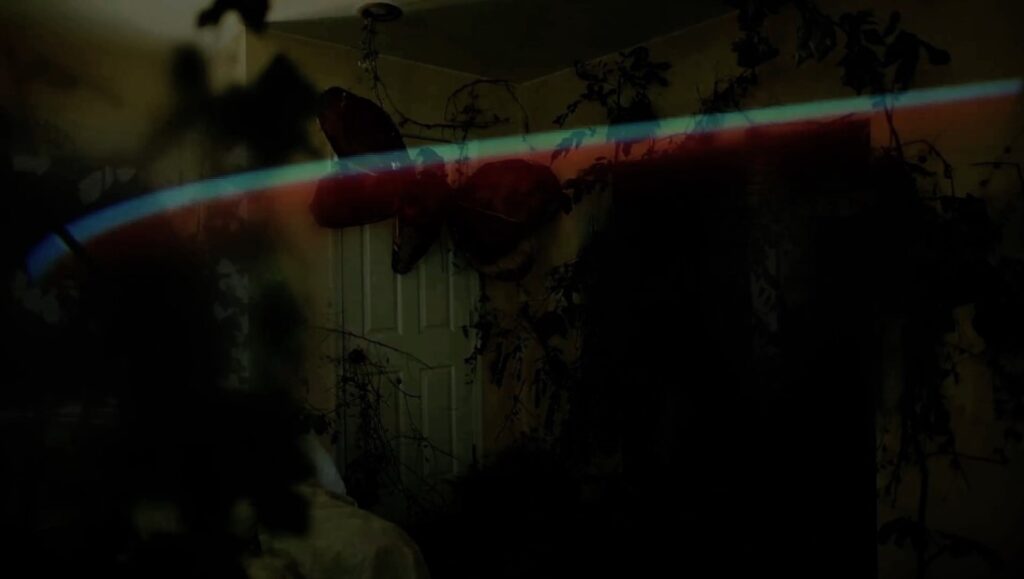The past invades the future in Paul Owens’ Landlocked, a low-budget, minimalist horror drama that’s steeped in the nostalgic haze of VHS grain and childhood memories. Having directed documentaries for over a decade — most of them set in the world of video games and video game culture — the film marks the narrative feature debut for the writer-director, and his documentarian sensibility comes through as he weaves his family’s home videos into a slight but novel supernatural thriller plot. In Landlocked, Mason (Mason Owens) returns to his soon-to-be-demolished childhood home after the death of his father (Jeffrey Owens). Rummaging through old boxes, he comes across a mysterious VHS camera that allows him to see into the past whenever he peers through the viewfinder. He soon begins recording his findings obsessively, desperate to hold on to the memories he fears will be lost with the house’s demolition.
Owens fills his images with the fluorescent glow of CRT screens and a few creepy, intensely voyeuristic sequences that are, somewhat surprisingly, situated in similar aesthetic territory as the transgressive pinku eigas of Japanese underground filmmaker Hisayasu Satô — although they, perhaps less surprisingly, lack Satô’s thematic provocations. Instead, Owens makes liberal use of slow cinema conventions, namely the
genre’s long, uninterrupted takes, to give the audience a sense of the film’s setting. Landlocked moves along at a deliberate pace, even with its concise 75-minute runtime; early on, there is a tangible sense of melancholy in the scenes where reality and fiction converge. Whenever Mason looks through the lens of the time-bending handheld camera, the dilapidated house and neglected, junk-littered backyard momentarily spring to life with the blissful sounds of happy children and proud adults, contrasting sharply with the eerie silence that now pervades them. He is quick to embrace this miraculous occurrence, happily reliving his long-gone salad days. But his scanline reverie turns grim when a sinister presence finds its way into his former home as well.
It’s a compelling concept: Mason’s retreat into nostalgia brings momentary comfort while also carrying the pain of old wounds. But while Owens’ unique spin on found footage horror is undeniably creative, his protagonist’s endless wandering and constant tinkering with retro gadgets begin to wear thin eventually. There’s a warmth to the clunky, tactile clicks and buzzes of cassette tapes and VCRs that brings to mind a bygone era’s outmoded tech, and Landlocked utilizes its slow-burn approach to dwell on the evocative analog particulars that likely still linger vividly in the minds of everyone who grew up with them. But after a few return trips to the crumbling living room where Mason reviews the countless hours of footage he shot, the glowing bulbosity of passé TV sets begins to lose its luster, and the seams of the underwritten script begin to reveal themselves.
In a similar vein, the pristine digital cinematography, which makes for a striking contrast with the staticky scuzziness of the home videos, fails to ever feel truly “cinematic.” The shot composition, aside from a few exceptions, hardly adds any mystery or intrigue to the frame, and it speaks to the strength of the central formal idea that the film nevertheless manages to get some of its images lodged in your brain, the sudden appearance of a menacing, shadowy entity proving to be particularly haunting. But when measured against a work like Joel Anderson’s sorrowful 2008 ghost story Lake Mungo — a mockumentary of similar thematic terrain — it doesn’t feel like Owens’ low-key DIY outing has anything insightful to say about grief or letting go. It’s a shame, as the seeds of a fantastic and affecting film are there. But as it stands, Owens doesn’t quite have the chops to execute his ambitious ideas, even as his first foray into fiction manages to conjure some captivating moments. Who knows? Those might just indicate bigger and better things to come.
Published as part of InRO Weekly — Volume 1, Issue 2


Comments are closed.